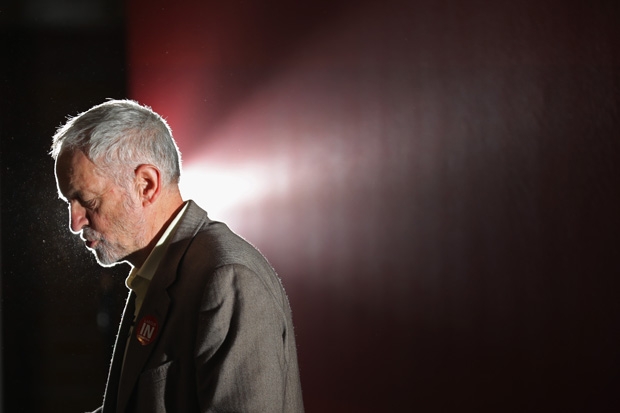A few weeks ago, I took part in a debate at the Cambridge Union about the future of the Labour party. I argued that a combination of factors, such as the decline of Labour’s working-class support, the election of Jeremy Corbyn and the party’s near-universal backing for the EU, meant that Labour would struggle to survive in its present form. But I thought the crisis point would come after the next general election, not after the referendum. It didn’t occur to me that the party would be in its death throes by the end of the month.
I suppose I have to accept a small amount of responsibility for this. During Labour’s leadership election last year, when Corbyn was still a rank outsider, I helped to launch a Tories4Corbyn campaign, urging fellow Conservatives to take advantage of the party’s new membership rules whereby you could become a registered supporter for just £3 and vote for the 67-year-old old communist. I don’t know how many did and my own efforts to join were foiled by a party hack. It probably had something to do with the reason I gave on the official application form: ‘To consign Labour to electoral oblivion.’
One of my co-conspirators —Paul Staines, the man behind Guido Fawkes — has suggested we resurrect Tories4Corbyn, but I’m not sure it’ll be necessary. At the time of writing, it’s not clear whether there’ll be another Labour leadership election, but the polls suggest he’d win about 60 per cent of the vote, just as he did last year. Several left-of-centre journalists have urged people to shell out £3 so they can save the party from Corbyn — it seems to be connected with their despair over losing the referendum – but I doubt they’ll beat the Trots at their own game. For every Financial Times reader that becomes a registered supporter, at least three SWP activists will sign up.
Part of Labour’s problem is the party’s dearth of talent. At the moment, the two leading Corbyn challengers are Tom Watson and Angela Eagle. Can it really be true that the hopes of a political movement dating back to the 19th century rest on the shoulders of a man who believes Edward Heath operated a paedophile ring out of 10 Downing Street and a woman who came fourth in Labour’s deputy leadership election last year?
The best hope for Labour MPs, 80 per cent of whom rejected Corbyn in a confidence vote on Tuesday, is if the party’s national executive rules that the current leader doesn’t automatically have to be included on the ballot. If that happens, Corbyn would have to persuade 35 MPs to nominate him and he might struggle. In the confidence vote on Tuesday he was able to muster 40 loyalists, but some might be prised away if the unions decide to back Watson. Trouble is, there will be uproar among the party members if Corbyn isn’t on the ballot, just as there would be among Conservatives if Boris is kept off theirs.
In a sense, the crisis engulfing Labour is a microcosm of what occurred last Thursday in the referendum. Both reflect a loss of confidence in our elected representatives and a decline in the authority of Parliament. The revolt against the Parliamentary Labour Party that occurred last September, with hundreds of thousands of activists imposing a leader on them that few MPs had any faith in, was a precursor of the revolt that took place last week, with the electorate imposing a decision on Parliament that two-thirds of MPs profoundly disagree with. It feels like a sea change in British politics, a move away from representative democracy to something more direct.
The Labour MPs who want rid of Corbyn have threatened to form a breakaway group in Parliament if he’s re-elected, but I don’t fancy their chances if that happens. Pro-Corbyn activists, organised by the formidable Jon Lansman, founder of Momentum, will immediately set about deselecting them. Even those that manage to cling on — and how many will have the stomach for such an unpleasant fight? — will then struggle to get re-elected, given their outspoken support for the EU. In most Labour constituencies, between a third and a half of the party’s supporters voted for Leave.
In this brave new world, the political spoils will go those capable of forging a direct bond with tens of millions of people, most of them disillusioned with traditional sources of authority. That’s not Jeremy Corbyn, but it’s not any of his opponents either.







Comments